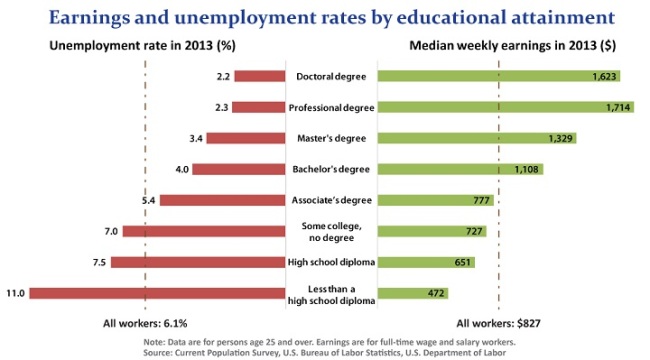While many will emphasize the high cost of a college education as a rationale against college education, the act of obtaining a college degree in many ways ought to be viewed in terms of long-term investment rather than short-term costs. Rather than viewing college as a lump sum to be paid off in piles of debt and other various costs, one ought consider various long term advantages of a successful college education (a successful college education in this case signifies the act of obtaining of a degree) which include, the monetary advantage of obtaining a college degree, proof of competence in the work force, as well as opportunities for personal advancement. Upon consideration of these various factors, it becomes evident that respective higher salary, better work prospects, and exploration and cultivation of interests are the most significant benefits of a college education, which justify the costs of college in the long-term and motivate students, governments and non-governmental associations to invest and promote the financial welfare of college students.
To delve into this issue, one must first consider the first component of this investment: that of long-term pay-off. College graduates face the possibility of higher salary than non-college degree counterparts and are comparatively less likely to be unemployed. As seen in the figure below, the median weekly earnings of an employee with a Bachelor’s degree are nearly that of an employee with a high school diploma. The latter employee is two times as likely as the former to be unemployed in the current job market.1
Source: http://www.bls.gov/emp/ep_chart_001.htm
In this manner, there is a significant gap in employment between those with a high school diploma and those with a Bachelor degree. This gap in employment is even more significant in the long term, where it amounts to thousands of dollars of difference in wages.
For firms and hiring bodies, a college education with a degree can serve as a measure of employee competence. In measuring employee productivity and performance, employers often times evaluate skill set, the benefits of former training and individual capability to evaluate whether or not an applicant would prove to be a valuable asset to a firm or business. It is thus that by procuring a college degree the individual is deemed worthy of an occupation through educational and vocational experience. When this vocational competence is coupled with the individual’s attitude, ability and accessibility, it is evident that an application of skills and knowledge is equally as important as the skills themselves. Ergo, a college education becomes a true measure of competence through which the employee uses standard procedures and prior training to accomplish a task.2 In this manner, the college degree serves as an indicator of skills, training and other enable business owners to invest in the employees who are proficient in the field of interest and will help build business success.
Finally, college gives individuals the opportunity to cultivate personal interests and to grow intellectually in the process. This component of a college education is often defined as, “the ability to understand and manage self, to function effectively in social and professional environments and to make reasoned judgments based on an understanding of the diversity of the world community.”3
Higher education, in this way, is about more than obtaining a degree for a foothold in the workplace. Ultimately, higher education is about making student capable of improving quality of life for themselves, their families and their communities. Students are challenged to achieve and set personal goals, to build strong character, and to effectively communicate their ideas, so as to implement positive change in society. These aspects of personal growth, often stresses as core underlying values of under-graduate institutions, supplement the economic motivation and advantages gained by students.
It is thus that a college education and the act of obtaining a graduate or under-graduate degree is a positive act through which one invests in a future of life-long opportunity. These opportunities range from economic opportunity, in the form of higher wages and employment, to personal and community growth. Thus, it appears that there is much to be gained from a college education: namely innovation and positive change in society, which improves quality of life for all involved.
Sources:
1. US Department of Labor. (March 24, 2014). Bureau of Labor Statistics: Employment Projections. Retrieved on April 10, 2014, from http://www.bls.gov/emp/ep_chart_001.htm
2. Tamkin, Penny. (2005). Measuring the Contribution of Skills to Business Performance: A Summary for Employers. Retrieved on April 5, 2014, from http://www.cipd.co.uk/NR/rdonlyres/045262BD-5812-4221-A392-214D7EC52B6E/0/mesdconsklbpsum.pdf
3. Central Piedmont Community College. (2014). Personal Growth and Responsibility. Retrieved April 2, 2014, from http://www.cpcc.edu/learningcollege/core-competencies/personal-growth-responsibility

